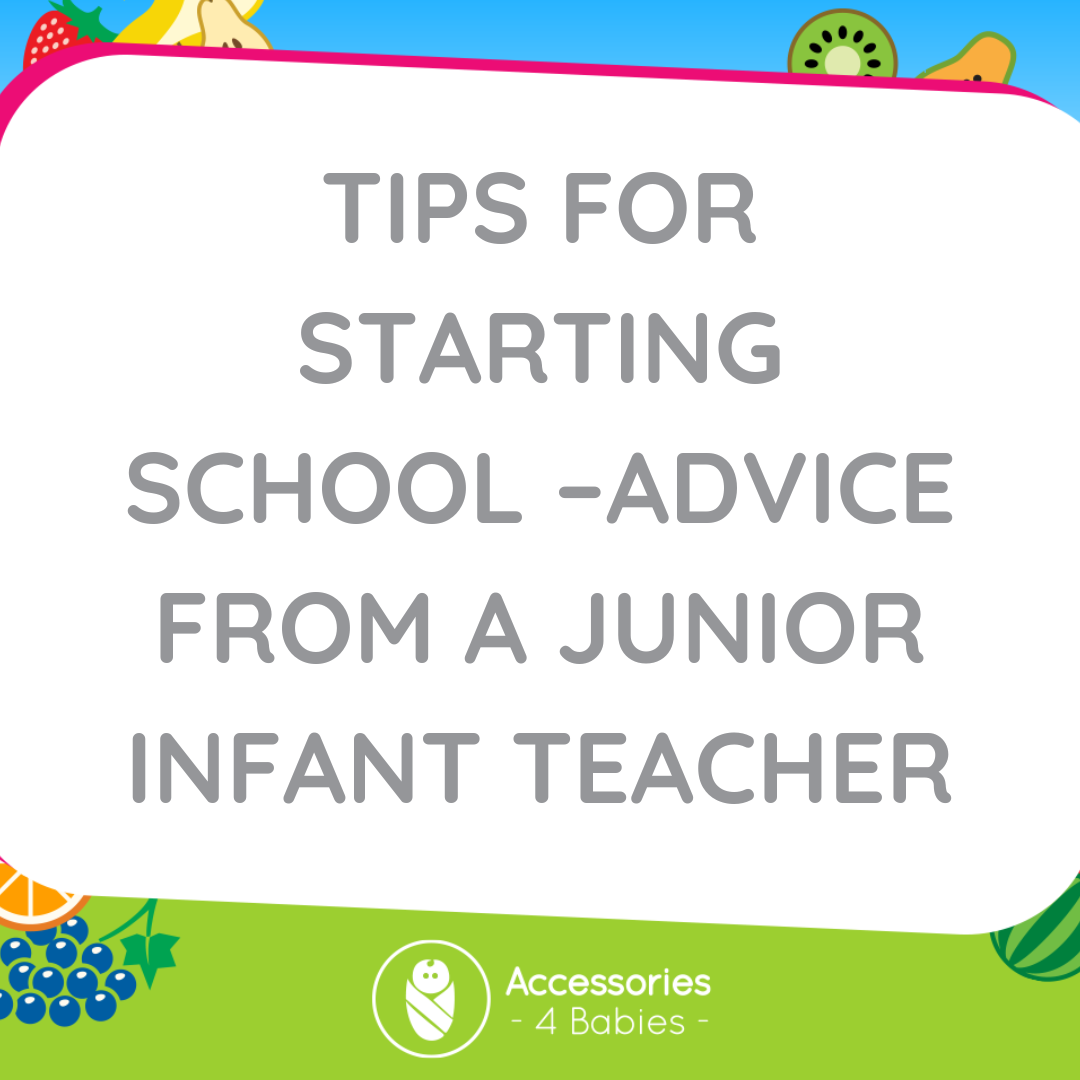
Tips for Starting School –Advice from a Junior Infant Teacher
Tips for Starting School –Advice from a Junior Infant Teacher
The first year of school is an extremely big deal. Not just for the children but for you, the parents too! You are placing a huge amount of trust in the hands of a stranger to care for and to protect your child, and since becoming a mum myself, I appreciate that level of trust even more!
There are lots of things you can do as a parent to help make the transition to big school as smooth as possible for your child. I’ve listed a few tips and tricks to get you on your way:
- Writing their name
It does not matter in the slightest if your child cannot write their name starting school. If they can, great! If not, no worries! However, if you are teaching them, do your child one huge favour and don’t teach them to write their name using only capital letters, i.e. C-L-A-R-A. Use the capital for the first letter and lowercase for the remaining, i.e. C-l-a-r-a. It sounds silly but it’s extremely hard to re-teach a child how to write their name and it’s very frustrating for a young child to learn one way at home to be told by their teacher that the way Mum or Dad. Showed them is in fact the wrong way! If you are doing some name work, use highlighters and get your child to trace over them!
- Schoolbags
It happens every year. 90% of the school bags in the classroom are much too small. Yes, it might be a beautiful school bag with the most current Disney character but if it’s too small, then it’s pointless. Lunchtime and hometime are stressful enough for young children without the additional panic of trying to cram things into a teeny tiny bag. Most schools require the children to have a plastic folder for homework, so the school bag needs to be big enough to carry a plastic folder, their lunch, a rain coat and a drink – and then whatever pages and artwork the children bring home too!. So pick practical over pretty! Don’t forget to spend some time practicing opening and closing the bags too – some children find the zips tricky! Same goes for the lunchboxes – take time to practice opening, closing and packing them away!
- Labels
The thing is with our shopping habits these days is that a lot of the children will come to school with the same coat, hat, bag, lunchbox – it’s endless. One of the most frequent disputes in the infant class is when belongings get mixed up. So, take my advice and label EVERYTHING. You can get those iron-on labels for clothes but to be honest a sharpie on the label does just as good. Label school bags, lunch boxes, pencil cases too. Everything!
- Putting on Coats
One thing your child really should be able to do, is open, close and put on their own coat. A great trick is the ‘flip coat’. Show your child how to lay their coat out on the floor. The sleeves and the collar should be closest to them. Slip their arms into the sleeves and show them how to flip it over their head. Hey presto, coat on, no drama!
- Velcro Shoes
Another massive favour you can do for your child is to buy them shoes with a buckle fastening or Velcro. Laces can be tricky, germy and a serious tripping hazard in the yard. Velcro makes the children all the more independent too!
- Have a dress rehearsal
If your child has a specific uniform to wear, I advise spending some time trying on the uniform – taking off the jumper or using the toilet. If it’s a formal uniform, the buttons and clips on the trousers can be tricky and having a bit of practice with these can save on accidents in the first few weeks. Even better, have a look for trousers with an elasticated waist!
- Get excited
Children are little emotional sponges. They sense your emotional energy and soak it all up. If you are blatanly nervous or anxious about them starting school then they are likely to pick up on these anxieties and begin to feel that way themselves. Spend the next few weeks ‘bigging up’ school. How exciting it will be, all the lovely things you’ll do, all the wonderful friends you’ll make, the exciting toys and of course, the lovely teacher they’ll have! School is a very different place now to when we were all in infants. The learning is much more play based and age appropriate, they’ll love it!
- Punctuality
When possible, always strive to have your child in school on time. The first 30 mins of the day can be some of the most important and informative for children in terms of sharing news, picking teams and receiving instructions. It’s quite upsetting for children to be late and realise that the teams have been picked, the toys have been allocated and they missed the chat with teacher at the start of the day.
- Drop & Go
On the first day, usually parents get to hang around for a little bit, take a few photos etc, it’s lovely. However, from then on, my advice is to follow the ‘drop and go’ approach. The more you hang around and linger, the harder it will be for your child to settle. Try not to get annoyed if there are some tears, trust me, there’s always a few tears but believe me, there’s so much fun and distraction all around that the children soon forget about you.
- Ask Questions
Ask all the questions. Show interest. Who did you play with? Who are you sitting beside? What toys were there? Did you learn any songs? What was the yard like? Parents often get frustrated when they ask ‘What did you do at school today?’ and their child answers ‘Nothing’. But do remember, that one little day at school can be jam packed from start to finish and ‘nothing’ can mean a whole lot of things.
The Nothing Poem
When children come home
At the end of the day,
There’s a question they’re asked
As they’re rushing to play…
“What did you do in school today?”
“Nothing! I did nothing today!”
But nothing can mean that I played with blocks,
Ties my own shoes or found beautiful rocks,
Maybe the butterflies hatched today,
Or maybe I found a new friend to play.
Maybe today was the very first time,
My scissors followed a very straight line,
Perhaps I learned a new song and sand all the words,
Or stroked the feathers of a beautiful bird.
When you’re in infants and your heart has wings,
‘Nothing’ can mean some wonderful things!
Author unknown
So, enjoy the big day, the big year, the start of this exciting new chapter. Junior Infants is one of the most important years in a child’s education. They will never learn such an amount of core and formative information in a single year of school again. Setting them up to succeed and to settle in will be a massive help for your child. Take all the photos, treasure the memories and just be so proud of them!
Best of luck!
Clara
Clara has ten years primary school teaching experience -four of those being with Junior Infants. She runs a busy teaching blog ‘www.littlemissteacher.com’. Clara now lectures full-time in Literacy and Early Childhood Education and is currently beginning her PhD research on the relationship between Play and Early Literacy Development. You can follow her pages on Instagram. Facebook & Twitter

Stockists





